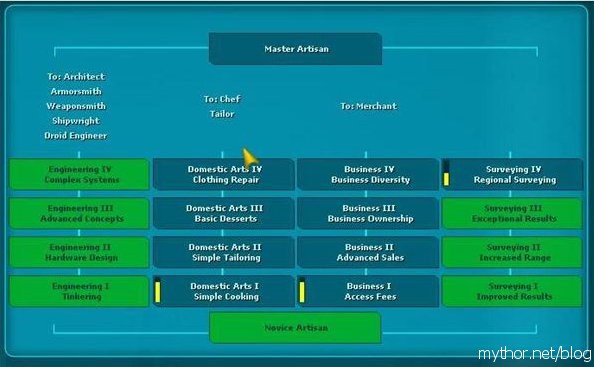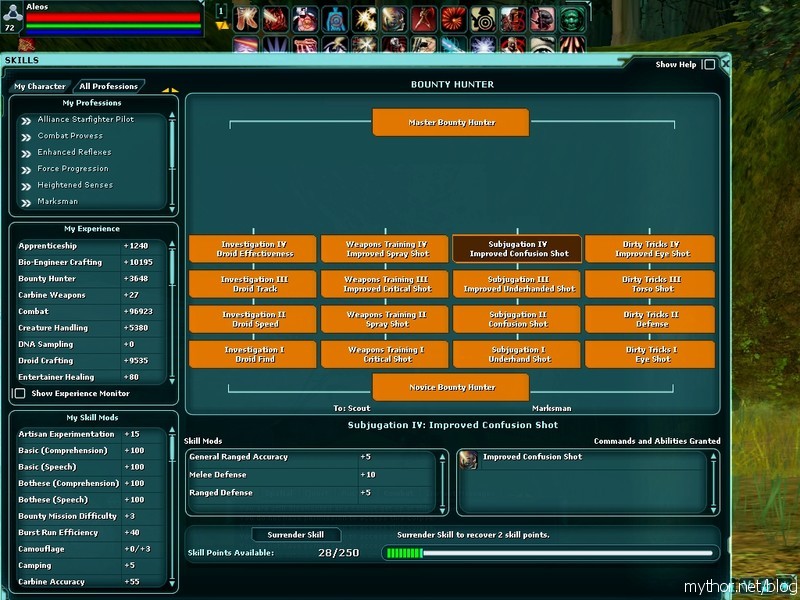If you’ve played Star Wars Galaxies in the past couple of years you could be forgiven – barely – for thinking the game is nothing but a World of Warcraft style MMO when it comes to selecting and playing a class in that galaxy far, far away. It hasn’t always been so.
What you’ve experienced is what Sony Online Entertainment dubbed the “New Game Experience”, commonly abbreviated as the NGE, introduced in 2005 in a misguided attempt to recapture player interest in the game.
But what came before the NGE? How did players develop their characters before the dark times?
It all started with visiting one of the Novice level trainers for a starting profession – Artisan, Brawler, Entertainer, Marksman, Medic or Scout – and paying to unlock the first box in what, nowadays, looks very much like a talent tree from any number of other MMOs.

Each starting class then has four branches of development. In the case of the Artisan, the base crafting profession, you can advance in the Engineering, Domestic Arts, Business and Surveying lines. Each branch typically required a different kind of experience gain to advance. Engineering, for example, could be advanced via crafting weaponry or simple structures like moisture vaporators or small mining excavators. Domestic Arts would require cooking food or crafting clothing. Business, if I recall correctly, required a “General” type of XP you could gain from crafting items like chance cubes or some backpacks. Surveying, unsurprisingly, required Survey XP which you would gain from using devices to track down mineral deposits and digging those deposits up out of the ground.
Other base classes had a similar system – Marksman had branches for Rifles, Carbines, Pistols and Support. In order to reach the Master box for a profession you would need to fill all four branches of the tree. Meaning a Master Marksman had not just gained the experience required with a rifle, they’d also done the same with a carbine and the same with a pistol – the XP required for Support would generally come on the way to the fourth box to one of the other branches.
The perks for reaching Master in a profession don’t always end at a fancy title and some more skill modifiers and abilities. Mastering the Scout profession would unlock the elite Ranger profession for training, giving you better bonuses when harvesting creature hides, larger camps to construct and a greater ability to negotiate difficult terrain. Mastery of the Medic field leads to the Doctor profession, with an expansion of your healing abilities and the addition of some very useful buffs.
Not all the elite professions required mastery of a base profession. If you just want to stick with rifles you can enter the Rifleman profession with just the rifle branch of Marksman. Entry into the Dancer profession required the dancing boxes and the “support” tree of Entertainer, known as Entertainment Healing.
Then you have the hybrid advanced professions. If you wanted to train as a Bounty Hunter you had to pick up both Novice Scout and Novice Marksman. You needed one complete line, Exploration, in Scout and you had to achieve Master Marksman. Commando required the Unarmed line from Brawler and Master Marksman. Squad Leader? The Support line in Marksman and the Exploration and Survival lines in Scout.
But at no point are you railroaded into any of these options. If you want to be a Rifleman by day and a Dancer by night? Completely free to do that. You’re bound only by the limit of 250 skill points in total, with boxes higher up the Starting Profession trees costing more points and boxes higher up the Advanced Professions taking fewer.
This obviously opens up a lot of options for players looking for some diversity in their combat. A popular combination for a long time was Rifleman for ranged combat with Teras Kasi for melee fights and the handy Meditation skill, which would boost your damage and defenses before a fight.
It wasn’t limited to just the fun or the diverse, either. People discovered that the bonuses to skill modifiers you gain through certain professions would stack additively with the bonuses from others. The bonus to your Dodge rating from Fencer would stack with the one from Pistoleer, meaning someone who has mastered both professions would have a very high chance to dodge attacks, whether wielding a pistol or a one handed weapon.
And part of the genius of it all was that you weren’t restricted to just filling all these boxes by visiting your trainer and coughing up your credits – any player who has already learned a skill can then go on to teach any other player, assuming they meet the requirements. Both a vast improvement over other games both before and since but also a great community building mechanic. Having a friend or guildmate of the appropriate profession as a mentor meant you had someone on hand to train you as you reach the XP requirements and, generally, they wouldn’t even charge you for the training!
But what if you don’t like your chosen profession?

Yes, Star Wars Galaxies had a respec system. Back in 2003 a game featured such a thing and the world didn’t end as a result. Take that, respec haters!
Surrendering a skill box removed any bonuses provided by that box and refunded the skill points used, allowing you to select a different box instead. And you could do it as often as you like, for free, anywhere and on any planet. Of course surrendering all your skills among nests of rancors on Dathomir was not advisable, but if you had a mentor along you could work your new skills back up without returning to town.
Or you could give up the adventuring life and take up crafting or entertaining for a change of pace, if being rancor bait no longer appeals.
An unprecedented level of freedom in character development and one of the deepest systems ever to appear in an MMO and… they replaced it with a WoW/Everquest system clone.
MMO developers are strange.